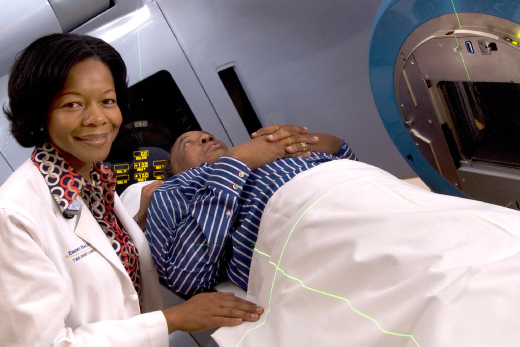A Rapid ARC for recovery

This summer, Linwood Holeman received radiation therapy at Emory University Hospital Midtown, overseen by oncologist Karen Goddette. Emory's new system is quicker and more precise than traditional radiation therapy.
Linwood Holeman thought he was taking good care of himself. He'd been a vegan for 10 years, eating no meat, cheese, or animal by-products. He didn't smoke or use drugs. He exercised regularly. Still at age 67, he got a dreaded diagnosis: prostate cancer.
It was the disease that already had taken a heavy toll in his family. His grandfather, dad, and uncles on his dad's side of the family all had died of prostate cancer. But unlike his father, whose cancer had spread before it was diagnosed, Holeman was keeping close watch for signs of the disease. He saw his internist twice a year for check-ups, and in one 6-month period, his vigilance paid off. A blood test for early detection of prostate cancer showed his prostate specific antigen score shot from 0 to 4 in less than 6 months, indicating that something was amiss.
|
|
Linwood Holeman receives radiation therapy at Emory University Hospital (EUH) Midtown via a new delivery system. RapidArc is a faster and more accurate method of aiming radiation at prostate cancer cells and leaving healthy cells unharmed. EUH and EUH Midtown are the first facilities in the state to offer the system.
|
|||
Holeman, who had his own accounting software business for 26 years, has another advantage: access to the newest radiation oncology treatment system in Georgia. Each weekday, he receives radiation therapy at Emory University Hospital (EUH) Midtown via a new delivery system. RapidArc is a faster and more accurate method of aiming radiation at prostate cancer cells and leaving healthy cells unharmed. EUH and EUH Midtown are the first facilities in the state to offer the system.
Even when a person is lying still, internal organs continue to move in response to breathing and other normal functions, such as digestion. For cancer patients undergoing radiation therapy, these movements, however slight, can affect the accuracy and effectiveness of the treatment. For prostate cancer patients in particular, movement during radiation treatments can have tough consequences—damage to the bladder, rectum, or seminal vessels, which in turn can lead to incontinence or impotence. RapidArc, which matches or exceeds the precision of conventional radiation therapy, is available also for patients with head and neck cancers or brain tumors.
"The main advantages of this system are speed and precision," says Walter Curran, radiation oncology chair and chief medical officer of the Emory Winship Cancer Institute, the only NCI-designated comprehensive cancer center in Georgia. "This new system helps minimize the chance of movement, which affects accuracy during treatment."
RapidArc enables physicians to deliver a complete dose with a single rotation of the treatment machine around the patient. Treatments that once took up to 15 minutes can now be completed in less than 5. For patients like Holeman who get radiation daily over the course of several weeks, those extra minutes make a significant difference.
"It feels like you're having an x-ray," Holeman says. "There's nothing invasive. It doesn't hurt, and it's fast and easy."
Once he completes this course of radiation therapy, Holeman will receive a radioactive seed implant in the prostate, and he'll follow radiation safety precautions for eight weeks. After that, he hopes to get back to his favorite hobby—traveling. So far, he's trekked to Israel, Egypt, Ghana, Kenya, and Mt. Kilimanjaro. Another trip to Africa may be on the horizon. —Rhonda Mullen



